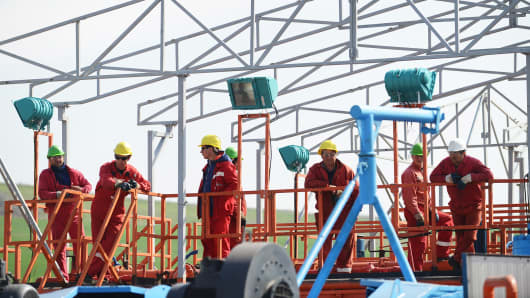Oil and gas giant Chevron
is giving up on its shale gas plans for Romania, marking the end of its
European efforts for the resource. And it's not alone in scrapping
European plans.
The California-based company said that the fracking project does not make economic sense at this time, so it is relinquishing its concessions in the country. Less than a month earlier, Chevron pulled out of shale gas exploration in Poland, citing similar reasoning.
The California-based company said that the fracking project does not make economic sense at this time, so it is relinquishing its concessions in the country. Less than a month earlier, Chevron pulled out of shale gas exploration in Poland, citing similar reasoning.
"Chevron intends to pursue relinquishment of its interest
in these (Romanian) concessions in 2015," the company's Kent Robertson
said in an email to Reuters. "This is a business decision which is a
result of Chevron's overall assessment that this project in Romania does
not currently compete (favorably) with other investment opportunities
in our global portfolio."
Chevron wholly owned and operated the 1.6 million-acre Barlad Shale concession in northeast Romania, and three concessions covering 670,000 acres in the country's southeast, according to the company's website.
Read MoreFracking for shale gas hits a raw nerve in Europe
The development marks a major blow for the European shale industry. Many European officials have designated energy development as a top priority, but popular backlash and a series of disappointing exploration results have stunted these hopes.
In fact, Romanian Prime Minister Victor Ponta indicated last year that oil companies could be on something of a fool's errand in his country.
Chevron wholly owned and operated the 1.6 million-acre Barlad Shale concession in northeast Romania, and three concessions covering 670,000 acres in the country's southeast, according to the company's website.
Read MoreFracking for shale gas hits a raw nerve in Europe
The development marks a major blow for the European shale industry. Many European officials have designated energy development as a top priority, but popular backlash and a series of disappointing exploration results have stunted these hopes.
In fact, Romanian Prime Minister Victor Ponta indicated last year that oil companies could be on something of a fool's errand in his country.
"It looks like we don't have shale gas, we
fought very hard for something that we do not have," Ponta told television channel Antena 3, according to Reuters. "I cannot tell you more than this, but I don't think we fought for something that existed."
A 2013 report from the U.S. Energy Information Administration projected that Romania held the fifth-largest unproved wet shale gas estimated reserves in Europe (trailing Russia, Poland, France and Ukraine).
Read MoreHow the US shale boom will be felt around the world
Poland, which was second only to Russia with 148 trillion cubic feet of initially estimated shale gas reserves, has also seen a series of disappointments. Several, in fact: Before Chevron pulled out, Exxon Mobil, Total and Marathon Oil also stopped similar exploration in Poland over three years, according to Reuters.
In an October article on the European shale industry, energy-focused site Oilprice.com said that Poland "represents the European Union's best hope at breaking Russia's grip over natural gas supplies."
France, meanwhile, also boasts promising estimated reserves, but it has a firm ban on fracking.
fought very hard for something that we do not have," Ponta told television channel Antena 3, according to Reuters. "I cannot tell you more than this, but I don't think we fought for something that existed."
A 2013 report from the U.S. Energy Information Administration projected that Romania held the fifth-largest unproved wet shale gas estimated reserves in Europe (trailing Russia, Poland, France and Ukraine).
Read MoreHow the US shale boom will be felt around the world
Poland, which was second only to Russia with 148 trillion cubic feet of initially estimated shale gas reserves, has also seen a series of disappointments. Several, in fact: Before Chevron pulled out, Exxon Mobil, Total and Marathon Oil also stopped similar exploration in Poland over three years, according to Reuters.
In an October article on the European shale industry, energy-focused site Oilprice.com said that Poland "represents the European Union's best hope at breaking Russia's grip over natural gas supplies."
France, meanwhile, also boasts promising estimated reserves, but it has a firm ban on fracking.
As for the oil majors that are withdrawing their bets on
European shale, they are making a strategic-level decision, Ildar
Davletshin, Renaissance Capital oil and gas analyst, told CNBC this
month before the latest Chevron news.
Those projects, he said, were always "relatively frontier," so they do not make much sense in the face of low energy prices while bigger opportunities lie in places like the Gulf of Mexico.
Read MoreFalling oil prices don't scare Russian energy firms
"Personally, I wasn't worried about Poland or Ukraine turning into a major center in the near term," Davletshin said.
In fact, he added, European shale exploration was already so questionable that Russian companies will only see marginal long-term benefit from the lack of competing supply.
Those projects, he said, were always "relatively frontier," so they do not make much sense in the face of low energy prices while bigger opportunities lie in places like the Gulf of Mexico.
Read MoreFalling oil prices don't scare Russian energy firms
"Personally, I wasn't worried about Poland or Ukraine turning into a major center in the near term," Davletshin said.
In fact, he added, European shale exploration was already so questionable that Russian companies will only see marginal long-term benefit from the lack of competing supply.


No comments:
Post a Comment